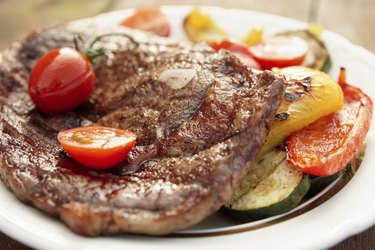
Just as often as carbohydrates and fat are shunned in the name of weight loss, protein is turned to as a sure-fire way to keep off excess pounds. Although protein is designed to maintain body tissues and can't be stored as-is, eating more protein than your body requires can lead to extra body fat.
Basic Function
Video of the Day
Your body is largely made up of protein -- it's what gives your cells structure and integrity. The amino acids in protein are the basic materials required to make and restore muscles, bones, organs, blood and other body proteins. Getting enough protein also allows your body to replace worn-out cells.
Video of the Day
Protein Conversion
Like carbohydrates and fat, protein provides calories. If you consume more protein than your body needs to maintain, repair and grow cells, the excess is stripped of its nitrogen-containing components and converted into glycogen -- and then glucose -- for energy. When this energy goes unused, it's converted into body fat.
Other Considerations
Intake guidelines suggest that protein should represent 10 percent to 35 percent of your daily calories. Consuming excess amounts can cause more than weight gain -- it puts extra strain on your kidneys and, according to the American Heart Association, may also increase your risk of heart disease, diabetes and cancer.